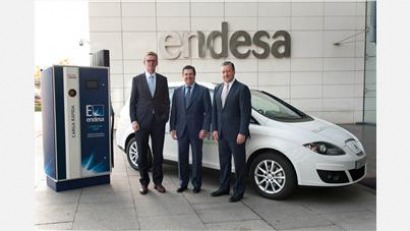
Endesa Chairman, Borja Prado, and the Executive Deputy Chairmen of SEAT, Matthias Rabe and Ramón Paredes, attended a meeting last week at which both Spanish companies confirmed their commitment to develop e-mobility and the electric vehicle as a means of promoting the fight against climate change and helping the companies successfully meet sustainability and economic growth objectives, while at the same time creating value for shareholders.
Through this agreement Endesa and SEAT plan to work together on e-mobility initiatives which will unlock the value of the leading positions they hold in their respective sectors. This agreement demonstrates the groups’ endorsement of the electric vehicle as a means of promoting the fight against climate change and helping the companies successfully meet sustainability and economic growth objectives while at the same time creating value for shareholders.
Under the agreement Endesa and SEAT will pursue several lines of action to promote this mode of transport over a two-year period:
A team of qualified professionals from both companies will carry out these technical studies.
Endesa and SEAT already participate in two initiatives aimed at promoting e-mobility in Spain: the CENIT Verde project, spearheaded by SEAT with the backing of the Ministry of Science and Innovation, and the LIVE public-private platform, backed by the Barcelona city council.
Electric vehicle development on several fronts
The development of a sustainable transport policy is a cornerstone of Endesa’s 2008-2012 Strategic Sustainability Plan. In Spain, the company is involved in rolling out e-mobility projects (MOVELE project) in Madrid and Barcelona, and in major technological initiatives (Cenit VERDE, DER22@ and REVE projects). It also recently entered into agreements with leading companies, such as SEAT, to promote e-mobility.
In Europe, Endesa is part of the Green eMotion consortium and is also the only Spanish company involved in the ELVIRE and G4V consortia aimed at developing the necessary technology, solutions and services to enable on-going interaction between drivers, their power suppliers and the smart grid. These projects also evaluate the impact of a large-scale introduction of EVs on the power grid.
Endesa was one of the first companies to join international standardisation and regulation groups for e-mobility equipment, systems and solutions. It is also European chair of CHAdeMO, the Japanese association that provides fast charge services for EV users and boasts the largest global footprint, aimed at expanding the installation of these recharging points worldwide and setting recharge standards.
For additional information:

